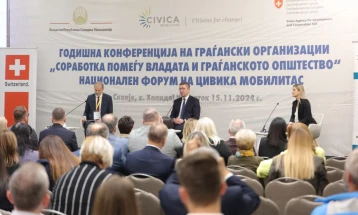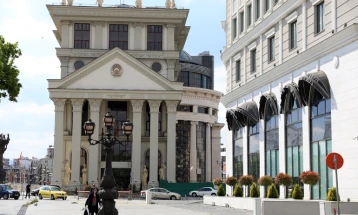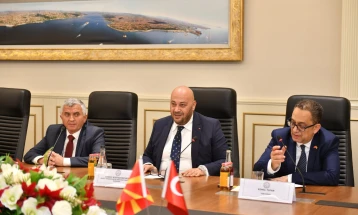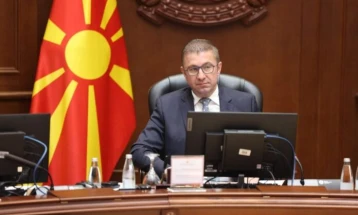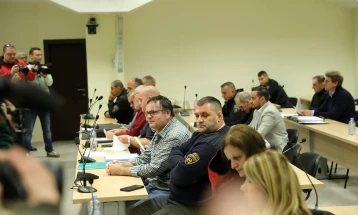Finance Minister: 2025 draft budget allows development with social component
- The 2025 draft budget is based on realistic macroeconomic assumptions and fiscal projections providing uninterrupted functioning of state institutions and regular servicing of obligations, Finance Minister Gordana Dimitrieska – Kochoska said Thursday addressing members of the Parliament Financing and Budget Committee, which kicked off a debate on the 2025 draft budget.
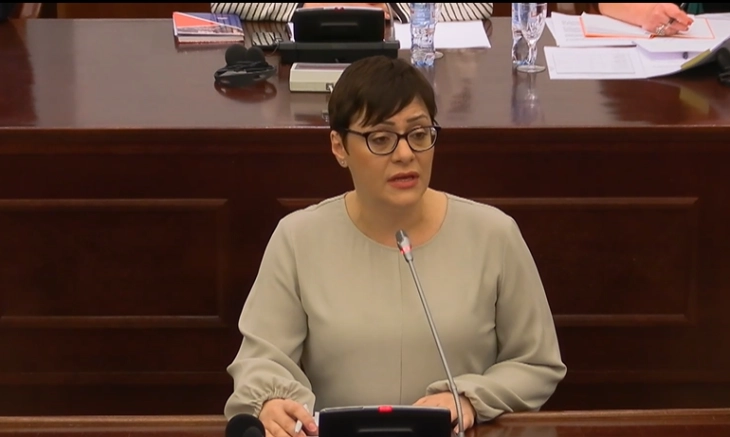
Skopje, 14 November 2024 (MIA) – The 2025 draft budget is based on realistic macroeconomic assumptions and fiscal projections providing uninterrupted functioning of state institutions and regular servicing of obligations, Finance Minister Gordana Dimitrieska – Kochoska said Thursday addressing members of the Parliament Financing and Budget Committee, which kicked off a debate on the 2025 draft budget.
According to her, the proposed budget allows development with a social component, featuring an additional characteristic that the trend of expenditure growth is lower than the trend of revenue growth – revenues are up by 13 percent and expenditures by 10 percent compared to 2024. This contributes to consolidation and reducing the budget deficit by about 3.3 billion denars.
“Behind the figures, there is a new concept,” said Dimitrieska – Kochoska.
“Figures that demonstrate fight against the informal economy, fight against crime, figures that will enable rising rates of economic growth and long-term sustainability. Fiscal policy for 2025 is in service of further consolidation, restructuring and optimization of public revenues and expenditures by reducing the level of budget deficit and public debt as well as stimulating economic activity through realized infrastructural expenditures.”
It is expected, she said, to record higher economic growth, higher salaries, better living standards for pensioners, better living conditions enabled by municipal projects and infrastructural projects, which will be stimulated by reform implementation with the support of the Western Balkan Growth Plan.
Inflation is expected to drop to 2.2% as a result of the prices of basic foodstuff and energy stabilizing on the international market.
Exports are expected to record an increase of 4.2% and imports by 4.4% as a result of gradual stabilization of international surroundings and increasing external demand.
It is expected positive macroeconomic movements to continue in 2025 and economic growth to accelerate to 3.7% as a result of significant rise in investments, solid increase in consumption and recovery of external demand.
Gross investments are expected to contribute most to growth of 8.1% in 2025 by accelerating implementation of state-funded major infrastructural projects as well as projects in energy, agriculture, education and healthcare. Additionally, growth will be supported by supporting municipalities to implement capital investments. A significant contribution is expected from investment activities of domestic companies as a result of funds provided through the Hungarian loan.
This basic macroeconomic scenario still contains risks in relation to geopolitical tensions, according to the Finance Minister. “The war in Ukraine negatively affects the European economy, especially the German economy, our top market to export good. Together with the Middle East conflict, it affects the global perception of peace,” said Dimitrieska – Kochoska.
Budget revenues are projected at Mden 358 billion (EUR 5.81 billion), a 13-percent increase compared to 2024, whereas expenditures stand at Mden 400 billion (EUR 6.49 billion), a 10-percent rise compared to the previous budget.
The opposition has said it won’t back the draft-budget, calling it “unrealistic and not allowing development.” SDSM MPs have filed over 200 amendments.
According to the new Parliament’s rules of procedures, commission members can debate the budget until November 30 after which the draft-budget should be passed at a plenary session.
In an interview with MIA over the weekend, Parliament Speaker Afrim Gashi announced that the draft budget should be scheduled for a plenary session in the second half of December.
Photo: printscreen
